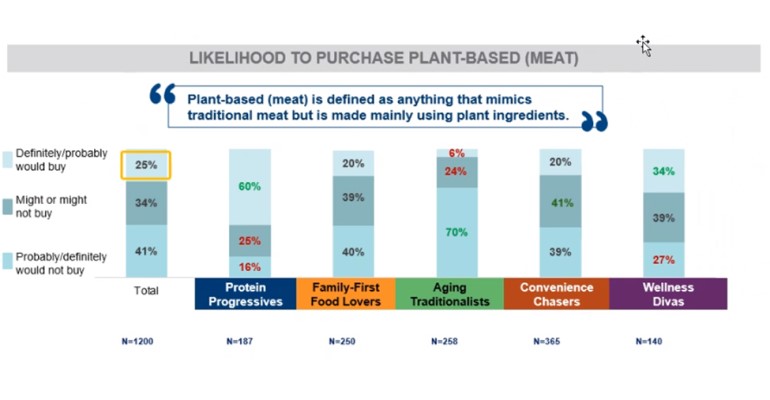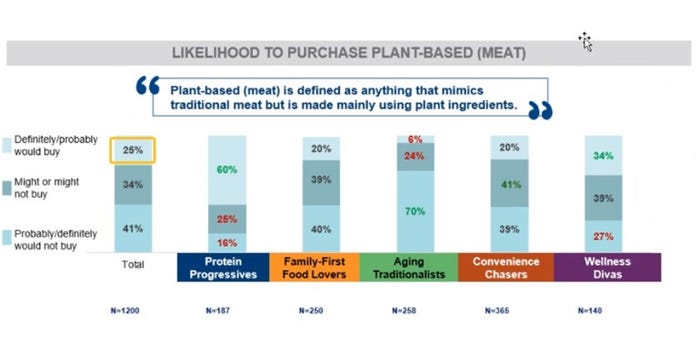Consumers view animal-, plant-based diets as sustainable
Plant-based meat alternatives being selected because consumers perceive these products to be healthier.

Two-thirds of consumers think an environmentally sustainable diet can include protein from both animal sources and plant-based sources, while only 10% disagreed, according to new research from the International Food Information Council (IFIC) as part of its latest consumer attitude survey.
“Environmental sustainability is clearly on the mind of many consumers, but sometimes in ways we might not expect,” IFIC Foundation chief executive officer Joseph Clayton said. “For instance, some consider nutritious food or recognizable ingredients as part of an environmentally sustainable diet. The findings also suggest that consumers believe that animal- and plant-based diets can coexist as sustainable options — particularly in the United States.”
There was, however, an education gap in the responses, with 73% of college graduates versus 62% of non-graduates agreeing that an environmentally sustainable diet can include protein from both animal sources and plant-based sources.
Nonetheless, animal-based proteins dominate our diets, with 92% of respondents reporting consuming protein from animal sources like meat, dairy, eggs and seafood. Age influences protein consumption: Consumers under 45 years are less likely to consume animal proteins (88%), while those 65 and older are much more likely to do so (98%).
On the other hand, nearly three-quarters (72%) of respondents report consuming protein from plant sources, but here, too, there was an education gap, with 80% of college graduates saying they consume plant-based proteins versus 66% of non-college graduates. Taste was far and away the most important factor behind those dietary choices, cited as the top reason for 81% of those who consume animal proteins and by 73% of those who eat plant-based proteins.
When people were asked how much of each source of protein they would need to consume to eat an environmentally sustainable diet, the responses varied: Only one-quarter (27%) said they would need to consume more plant-based protein, while 38% said such a diet would require the same amount of plant protein, and 11% said it would require less.
When it comes to animal protein, one-quarter (26%) said they would need to consume less to attain an environmentally sustainable and healthy diet, while half (53%) said it would require the same amount or more protein from animal sources.
Consumers were also asked what comes to mind when they think of environmentally sustainable animal protein. “No added hormones” topped the list at 50%, followed by “grass-fed animals” (40%) and “locally raised” (32%). Just 21% of respondents associated animals that were fed an organic diet with environmentally sustainable animal protein.
Understanding plant-based decision-making
According to research from Midan Marketing, the number one reason why respondents claim they would try plant-based meat alternatives is because they perceive these products to be healthier. As shown in the data from Midan Marketing’s Meat Consumer Segmentation 2.0, the driving segments behind this movement are primarily the Protein Progressives and the Wellness Divas.
However, there is some lack of awareness of what plant-based meat alternatives currently exist, as only 50% of meat-eating consumers are aware of specific plant-based meat alternatives. Of those 50% of the population who are aware, 47% of those meat-eating consumers believe they know what plant-based meat is. And after providing a definition on what plant-based meat alternatives are, one quarter of all meat-eating consumers would “definitely or probably” purchase plant-based meat, Midan Marketing’s Meat Consumer Segmentation 2.0 found.
“Our Meat Consumer Segmentation 2.0 research shows that a large percentage of meat-eating consumers who are aware of plant-based meat alternatives believe they understand what these products are,” explained Rick Lowe, senior market research manager, Midan Marketing. “However, when we asked these consumers what plant-based meat brands exist, the responses we received show that consumers have difficulty recalling plant-based meat brands and instead named traditional vegetarian brands or were unsure.”

About the Author(s)
You May Also Like




